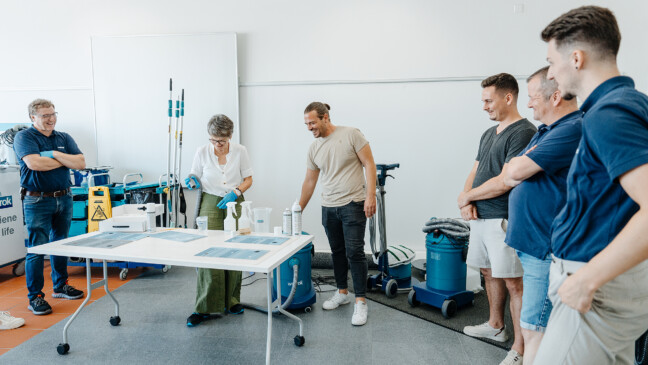
18.12.23
The complex world of standards explained simply
The SNV spoke to Urs Fischer, CEO of the Swiss Association for Standardization (SNV), for the series "The complex world of standards simply explained". With his stories and wealth of experience, he proves once again that standardization work is lively and sometimes less complicated than you might think. We also provide a deeper insight into the world of standardization with impressive and surprising figures.

How do you explain the complex world of standardization simply to outsiders?
I use musical notes as an example. They are a convention and function like a standard. Sheet music is the language for all musicians and guarantees that a piece sounds identical every time. They are also interoperable: they work everywhere in the world, regardless of which musical instrument is used to play them.
Where do you come into contact with standards in everyday life?
Everyone benefits from standardization work on a daily basis, in most cases unconsciously. It starts in the morning when you set the coffee machine or brush your teeth, take a shower and then apply cream. For example, the RDA value (Relative Dentin Abrasion) of a toothpaste indicates the degree of abrasion of the dental plaque. This makes it easier to choose a toothpaste for sensitive teeth. The ISO “Cosmetics” committee takes care of the skin compatibility tests for all creams and gives people the certainty that they can use the relevant products without hesitation. If you then cycle to work, the helmet has been tested according to the strict CEN standards. Standards protect consumers every day.
What are the new topics that standardization work will focus on in 2023?
The current topics are very wide-ranging. In the field of energy, we have just completed a guideline for liquid methane systems in Switzerland. The topic of aptitude diagnostics has appeared on the radar, as has the all-round professional supervision of apprentices, which has been set out in a guideline. Internationally, sustainability issues continue to gain ground. One example of advancing digitalization is the “ISO 12911:2023” standard, which deals with a framework for BIM (Building Information Modelling). The model describes how architects, planners and infrastructure operators must be able to access all information digitally without media discontinuity. This is a topic where we are lagging far behind in Switzerland.
Sustainability is a topic that also plays a major role in the UN’s Sustainable Development Goals (SDGs). How does this interact with the ISO standards?
In 2015, the United Nations drew up an ambitious 15-year plan to tackle the world’s most pressing problems. This resulted in 17 focus topics, the so-called “Sustainable Development Goals (SDGs)”. ISO contributes to all of these SDGs by developing and publishing relevant ISO standards with the world’s best experts. The absolute frontrunner is “SDG 9: Industry, Innovation and Infrastructure”. A total of 14,515 ISO standards contribute to the achievement of this goal. This is followed by 3,594 ISO standards on “SDG 3: Good Health and Wellbeing” and in third place 3,198 ISO standards on “SDG 12: Responsible Consumption and Production”. Without up-to-date international standards, industry and society will not be able to achieve the necessary goals. ISO is committed to working with its members, stakeholders and partners to ensure that ISO publications support the successful implementation of the UN Paris Agreement. ISO is also represented at the international climate conferences, most recently at COP28 in Dubai.
The actual standardization work takes place in the committees and the associated working groups. Have new committees been set up in 2023?
When we form committees in Switzerland, in most cases they are mirror committees. You can think of them as branches of companies abroad. The last ones we set up in this way were the “Hyperloop” and “Cannabis” committees. In my opinion, the topic of cannabis will pick up speed again in 2024. Hemp is a sensational plant with many areas of application. There is industrial hemp, food hemp, medicinal hemp and recreational hemp. The latter is the one with the intoxicating effect, which unjustifiably contributes to hemp’s bad reputation. We currently lack quality standards for the cultivation of hemp. The permitted tolerance limits for pesticide residues urgently need to be defined so that, for example, food is safe for consumers.
Are committees sometimes dissolved?
Dissolution is very rare. Every now and then a committee is put on “dormant” status. This means that the associated standards still have a port in case adjustments need to be made or someone is looking for a contact person. It is more common for two committees and their standards portfolios to be merged in order to avoid overlapping topics.
Are there also standards that were ready for printing but were not published after all?
In my 20-year career at the SNV, I have only experienced this once. About eight years ago, we were working on a European standard for halal food. At that time, individual representatives of the Muslim interest group insisted that we mention the Koran in the normative references. However, this contradicts the principles of standardization work, which is absolutely “value-neutral”. Standards have no political, religious or cultural dimension. Inclusion has been an issue for us for more than 100 years. Only when everyone is given a voice does a standard gain the necessary credibility. The draft halal food quality standard has still not been published and work on it was discontinued at the time.

Developing standards is a time-consuming process. Is that true?
This is not the first time I have heard this statement. What people often fail to realize is that the market is not concerned with time, but with the effectiveness of standards. A relevant time driver for development time is the consensus principle. It is decisive whether two or twenty parties are sitting around the table and how controversially a topic is discussed. Individual standards projects require complex tests or a round robin test by an external testing laboratory in order to make evidence-based statements that are incorporated into the standard. These are external factors that may seem time-consuming, but are essential for a credible result.
Is there an example of a standard that was developed in record time?
The community masks spring to mind. During the Covid outbreak, experts sprang up everywhere like mushrooms. Whether on Tagesschau, Arena or Kassensturz, the population was bombarded non-stop with different opinions. The SNV was called in to help put a stop to this and bring about a consensus among all those involved. At the time, we wrote to the experts appearing on television and radio and brought them together around a table. They all came and discussed the different views and poured everything into a uniform form. Due to socio-political pressure, we initiated a shortened procedure that resulted in a normative document, an SNR (Swiss Rule) and not a classic Swiss Standard (SN). This allowed us to dispense with the public survey, which invariably takes three months. SNRs therefore have a limited lifespan. The idea is to convert an SNR into a fully-fledged SN within a prescribed period or to let it expire at the end of this period.
Finally, do you have any wishes for the standardization work?
Our colleagues in Asia are very committed when it comes to new initiatives and physical presence in the working groups or meetings. This year we were able to organize an international meeting in Winterthur. The Chinese delegation arrived with a team of around 20 experts. Europe was represented by only a few people from Germany, England and Scandinavia. Most of them preferred to attend via webcall. In standardization work, discussions during the breaks or over lunch are just as important. I hope that Europe will be increasingly inspired by the commitment of the Asian member states.
Preview of SNV stories 2024
You can expect exciting interviews with important personalities from international standardization work. They reveal which topics are relevant in their markets. Urs Fischer reflects on the current status from a Swiss perspective.

